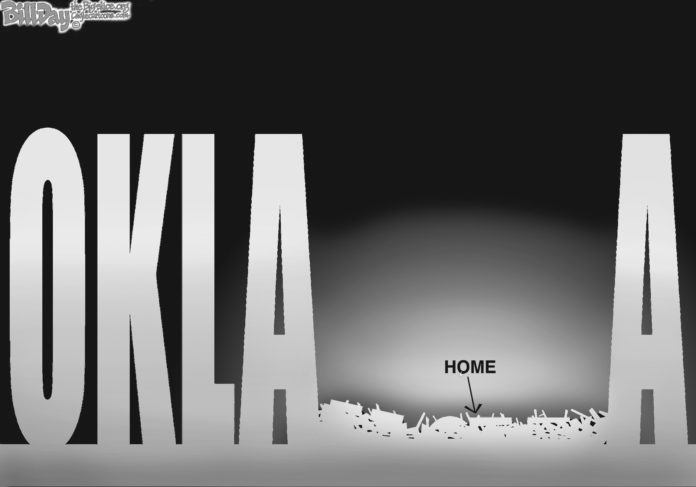BY FROMA HARROP
 The world looked upon the tornado-flattened landscape of Moore, OK, with awe. The destruction was shocking, as were the personal losses. Many Americans in the audience also felt – and this must be said – some comfort. Here was a country of strong people rolling with some very serious punches. It still exists.
The world looked upon the tornado-flattened landscape of Moore, OK, with awe. The destruction was shocking, as were the personal losses. Many Americans in the audience also felt – and this must be said – some comfort. Here was a country of strong people rolling with some very serious punches. It still exists.
On CNN, BBC or wherever, one heard plainspoken voices describing their ordeal with natural stoicism. These were victims [a word they might not apply to themselves] standing in front of the trash piles that were their houses. Some were bearing the death of loved ones, including nine schoolchildren. They spoke calmly of what happened and what they must do next.
In the world of TV coverage, miles of devastated streetscapes make for arresting visuals. For this viewer, seeing Oklahomans discuss the monstrous funnel’s rampage in a straightforward manner, only choking up at the end, was far more moving than a sensational telling drenched in passion.
But did that fit into the prewritten script that TV news follows in a disaster?
The camera does not love quiet forbearance. The script calls for wailing victims. And there must be heroes.
In this calamity, there was no shortage of brave people, putting themselves in danger to save others. Reporters found them easily and asked the stock question: “Do you consider yourself a hero?”
It’s rare that anyone will come out and say, “Yes, I’m a hero.” But there are ways to imply it. You often hear, sometimes with false modesty, “Anyone would have done what I did.” Television likes that. But when the Oklahomans were asked whether they considered themselves heroes, they were more likely to brush off the question or answer in a flat “nope.”
We glued to screens vividly recall the memorable moments when CNN’s Wolf Blitzer prompted a young mother to describe her close escape. Standing beside the exposed carpet of her wrecked house, Rebecca Vitsmun related in a matter-of-fact way how, when she saw the tornado heading her way, she grabbed her baby and made a run for it.
Vitsmun smiled through the entire interview, and so did the toddler. No tears. No moaning about how everything her family owned is lost. No mention of irreplaceable heirlooms smashed to bits. Hers was a harrowing story delivered matter-of-factly.
Almost in a fit of frustration for drama, Blitzer gives the woman her cue. “You’ve gotta thank the Lord, right? Do you thank the Lord for that split-second decision?” The script says that people in the heartland are prone to publicly thank the Lord with great emotion.
Showing considerable patience, the woman answers, “I – I’m actually an atheist.”
Taken aback, Blitzer says: “Oh, you are? All right.”
Vitsmun then responds with perfect grace, “We are here, and I don’t blame anybody for thanking the Lord.”
Tornado alley is a special kind of danger zone. When flooding is expected, people can move to high ground. There is no obvious place to flee in Tornado Alley. When the warning comes, it’s often just a few minutes’ worth. And any structure could be a bowling pin about to be knocked down.
A tornado is terrifying to look at, its freight-train roar horrifying. Coastal Americans visiting Kansas City take special notice of the “tornado shelter” signs in tall buildings. “We know we live in Tornado Alley,” many interviewees said with resignation. And they’re staying in Tornado Alley.
Most of the world has never been to Oklahoma. What it knows about Oklahoma may have come from the musical “Oklahoma!”
Note the exclamation point in the title. People in Oklahoma don’t talk in exclamation marks, and that’s all the more reason to keep it.
– Froma Harrop’s columns appear regularly in The Oklahoma Observer
Creators Syndicate








I don’t remember a moment similar to the Moore toranado disaster that received so much media and celebrity attention. We can continue to help one another as we always have as Oklahomans but I’m not keen on exploiting ourselves as helpless victims when we obviously know that one day a tornado will eventually come. I don’t want to come off as a heartless individual by no means.
I moved to oklahoma in 2007 knowing that i am scared of weather like this.I remember praying that all the kids and people were ok and then praying for families that had lost loved ones. i hope that they are safe from other storms that may come and may god bless
The Moore,Oklahoma tornado showed others how close Oklahoma really is as a whole. We can live all over the state no matter if its in the city or the country far east to west in the end when something happens to our land we all come together no matter how different we are and help our state. We dont have heros in oklahoma, we just have loving and caring people who take care of there state because it is their home. No matter what we get thrown at as a state rather it be weather,money issues, etc. we will come together as a whole because thats just who we are in oklahoma.